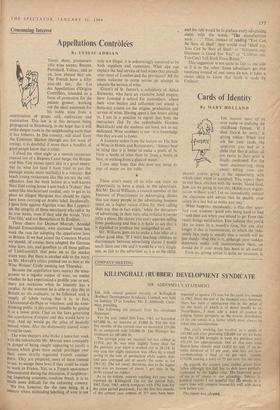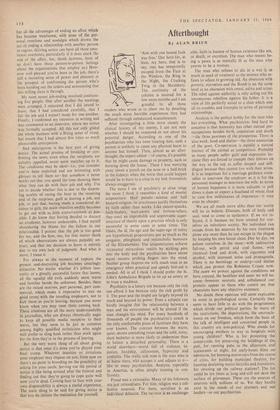Cards of Identity
By MARY HOLLAND
What happens,,•mundanely, is that they ques- tion your wisdom--good jobs being hard to find ---and then' ask when you intend to go. Even this rarely brings satisfaction. You indicate that you'd like to leave in a month's time, but can stay longer if this is inconvenient, to which the inde- cently fast reply is usually that a month will be just dandy. And this is it, although your sudden departure really . will inconvenience them, or should do if your work has been at all useful.
Even so, giving notice is quite an occasion. It
has all the advantages of ending an affair which has become wearisome, with none of the per- sonal emotions and nostalgia which drown the act of ending a relationship with another person in regrets. (Giving notice can have all those emo- tional overtones, particularly if it does mark the end of the affair, but, thank heavens, most of us don't have those person-to-person feelings about the organisations that employ us.) How- ever well pleased you've been in the job, there's still a mounting sense of power and pleasure at the prospect of confronting the person who's been handing out the orders and announcing that this willing slave is through.
My most recent job-ending involved confront- ing five people. One after another the meetings were arranged, I reiterated that I did intend to leave, that I had considered carefully, that I felt the job and I weren't made for one another. Finally, I confirmed my intention in writing and was summoned to an interview, where my notice was formally accepted. All this not only gilded the whole business with a fitting sense of ritual, but meant that I had almost five times as much pleasurable anticipation.
• And anticipation is the best part of giving notice. The actual process of breaking or con- firming the news, even when the recipients are suitably appalled, never quite matches up to it. The conditions may be ideal—i.e., you consider you've been exploited and are brimming with phrases to tell them so—but somehow it never works out that you spend the time showing them what they can do with their job and why. I've yet to decide whether this is due to the disarm- ing quality of seeing the boss at the receiving end of the surprises, guilt at leaving a job, any job, or just that, having made a considered de- cision to quit, the main objective swiftly becomes to get out with as little embarrassment as pos- sible. I do know that having decided to discard an employer, however undesirable, I find myself shouldering the blame for the failure in our relationship. I protest that the job is too good for me, and the firm, too, for that matter (both of which observations are always palpably un- true), and that my decision to leave is entirely due to my own lack of judgment. And what is more, I mean it.
For always at the moment of rupture the present soul-destroying job becomes amazingly attractive. No matter whether it's jobless inse- curity or a glossily successful future that looms, all the squalid old evils suddenly seem warm and familiar beside the unknown. Besides, there are the mixed motives, part personal, part com- mercial, which make it imperative to stay on good terms with the receding employers, not to kick them as you're leaving, because you never know when you may meet them coming back. These emotions are all the more understandable in journalists, who are always chronically eager to keep all possible media receptive to their wares, but they seem to be just as common among highly qualified technicians •who might well prefer to sling hash rather than work again for the firm they're in the process of leaving.
But the very worst thing of all about giving notice is that once it's done you've played your final trump. Whatever inanities or irritations Your employer may impose on you, from now on there's no point in brooding on the possibility of asking for your cards. Serving out the period of notice is like being around after the funeral and finding out that they're going to cope quite well now you're dead. Coming face to face with your own dispensability is always a rueful experience. The main thing to be said for giving notice is that you do initiate the realisation for yourself.







































 Previous page
Previous page